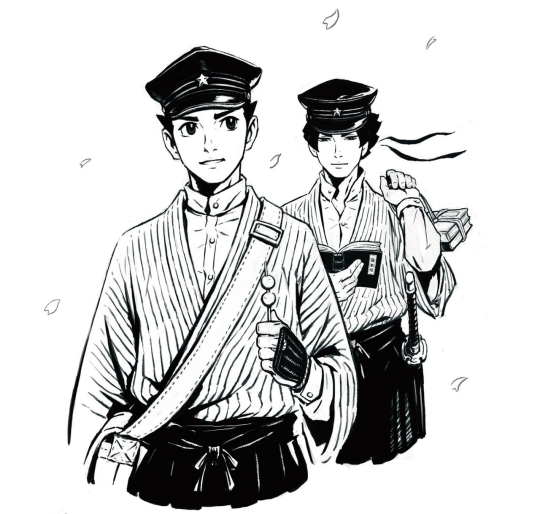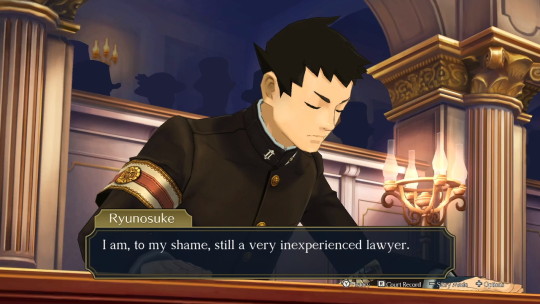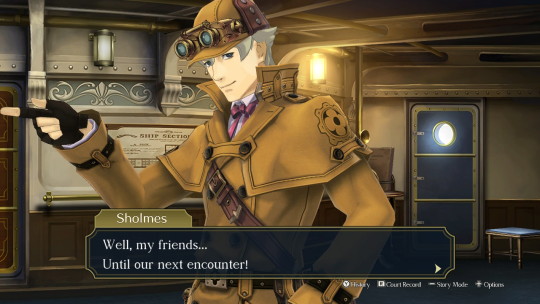#《⭒✩⭒ || verse: law student (kazuma) 》
Explore tagged Tumblr posts
Text

((HEYOOO everyone, the time has finally come! OWO 🙌💖 As promised, I'm going to start expanding my character roster by adding non-Genshin muses to this blog! I have so many muses who I'm so excited to share with all of you! 💕
Additionally, since many of my followers are Genshin-centric/feature Genshin characters, I'll be giving all the non-Genshin muses I add to this blog a Genshin!verse to allow for easier interaction with my followers and current partners! ;D
So with all that said, please welcome my first new muse! (´;ω;`)/

Kazuma Asogi from the Great Ace Attorney Chronicles has joined the roster of wanderers! ⭒✩⭒ See Kazuma's info HERE! ⭒✩⭒
If you're interested in interacting with an honor-driven lawyer with a passion for justice who will say anything he damn well pleases in front of God and everyone, please drop a like on this post for a short starter! Multimuses are free to comment if they'd like it directed at anyone specific!
Thanks so much for your time and your support! >w< ❤️))
#more of my menaces are coming you guys IT BEGINS#plz let my good fiery lawyer boy love you 🥺🙏#《⭒✩⭒ || new muse announcement 》#《⭒✩⭒ || visage: sword of justice (kazuma) 》#《⭒✩⭒ || interaction: sword of justice (kazuma) 》#《⭒✩⭒ || hc: sword of justice (kazuma) 》#《⭒✩⭒ || musings: sword of justice (kazuma) 》#《⭒✩⭒ || verse: law student (kazuma) 》#《⭒✩⭒ || verse: masked apprentice (kazuma) 》#《⭒✩⭒ || verse: prosecutor (kazuma) 》#《⭒✩⭒ || verse: genshin impact (kazuma) 》
4 notes
·
View notes
Text
Please note that Kazuma can also be inserted into a modern verse where he works for the Prosecutor's Office after arriving from Japan.
Kazuma Asogi was born as the only son of Genshin Asogi and hails from a well-known clan.He becomes a student at Imperial Yumei University studying law, while also serving as a defense attorney. Due to his exemplary academic achievements, he was also chosen to study abroad in the British Empire towards the end of Japan's Meiji era. After his best friend Ryunosuke Naruhodo was put on trial for the murder of John H. Wilson and subsequently acquitted, Kazuma requested that he accompany him to Britain.
Kazuma is introduced as a composed, yet hot-blooded and outspoken youth with a strong sense of justice. He's well-known around his university for his accomplishments as being skilled in both academics and martial arts; and, despite his young age, had been chosen to participate in an exchange program to travel to the Great British Empire and earn the qualifications to become a defense attorney. However, after things take a turn for the worst and, while possessing dark secrets of his own, Kazuma ends up becoming a prosecutor to avenge his father's death.
He possesses a sharp tongue, and is quick to challenge or defy authority figures; a point of contention from local bailiffs and later, Mael Stronghart. This extends to a strong hatred for corrupt authority as well, as Kazuma displays contempt not only for the Japanese government attempting to use Naruhodo as a scapegoat, but for the British government having done the same thing to his father Genshin.
He can overdo things to a fault, as displayed by how he practiced the tongue twisters he struggled with until his tongue bled. Kazuma is also willing to go to great lengths in order to help his friends, even if it means risking his career and aspirations; and, despite his acerbic nature, is deeply respectful to those he cares about, and will never fail to encourage them. It is because of these traits that Kazuma is set up to be an ideal, one that his best friend Ryunosuke Naruhodo would think to in times of need.
Following his return, however, his presented image of an ideal is heavily deconstructed. What were traits initially presented as positive are now taken to a harmful extreme, with the most glaring being his determination. Even without memory, he was so determined that he traveled to the Great British Empire through working on steamships while relying on his knowledge of the English language, along with his skill in lawyering. As Naruhodo later discovers, this is all done in the name of avenging his father, displaying a strong dedication to filial piety.
However, said determination and loyalty leads him to go to extreme lengths, which can harm both others and himself. Such is shown by how Jigoku used this determination against him, as his condition to participate in the exchange program was to murder Tobias Gregson; and, later on, how he forces Daley Vigil to recall a traumatic memory in order to find the truth. His anger and determination towards van Zieks for the apparent use of forged evidence also leads Kazuma to be set on convicting van Zieks of Gregson's murder along with the Professor Killings.
Kazuma is also noted to be very closed-off about his problems and past, which becomes more apparent after the regaining of his memories. This is displayed by his closed-off body language, along with his eventual breakdown: trying, and failing to keep himself composed. That aspect of his has also been a long-running one, as Naruhodo notes that he has brief moments where he has a dark expression regarding his mission, yet says nothing; furthermore, Yujin Mikotoba states that he never knew that Kazuma had known about the Professor Killings and his father's involvement, which ultimately motivated him to travel to Britain.
However, Kazuma still retains his strong sense of justice, along with his love for his friends. He is ultimately able to see past his anger thanks to Naruhodo's words, and assist in exposing the truth behind the Professor Killings. He also displays strong consideration towards them, as he encourages Susato to accompany Naruhodo back to Japan in order to aid him in his work.
Kazuma is also noted to struggle with tongue twisters; and, although not revealed to be his least favorite food, he appears to have a strong dislike for chicken to the point where he ate none of it when it was served for dinner. In terms of hobbies, he is stated to practice archery with Naruhodo alongside other martial arts, speech and debate; and, as his conversations in the Prosecutor's office show, is implied to have an interest in arts and crafts.
3 notes
·
View notes
Text
#3: Learning the Law in Meiji Japan
Spoiler warning: None!
TGAA appears to be set in a fictionalized 1900-1901, and at this point, studying law wasn’t as prestigious as you or I might imagine. This is in part because Japan’s nationwide legal system only crystallized about halfway through the Meiji Era, so there wasn’t a domestic legal system to study for quite a while. Read on to find out about what university would have looked like for law students like Kazuma!
🌸 Reblogs appreciated! 🌸

In 1871, the Ministry of Justice established Japan’s first institution dedicated to legal education. This wasn't a full-on university that anyone could apply to; rather, it was a training program for its own employees. Japan needed to develop a new legal system and train people in said system almost simultaneously, so the first priority was making sure members of the ministry were well-versed in international and domestic law. These student-employees received scholarships and were required to continue working in the Ministry of Justice for a fixed number of years. In other words, Japan's first law school graduates didn't immediately go on to become lawyers, prosecutors, and judges - most went into the civil service or administration. Before Japan developed its own legal codes in the 1880s, students were trained in French law.
Established in 1877, Tokyo Imperial University included Faculties of Law, Science, Medicine, and Letters. Aspiring students had to have 10-15 combined years of elementary, middle, and high school education. That might sound like nothing compared to today’s law school requirements, but keep in mind that widespread compulsory education simply wasn’t a thing yet. By the 1860s, about 40-50% of Japanese boys, and 15% of girls, had received any kind of education outside the home.
Japan wasn't alone in this. Other than Germany, which had already established compulsory education, other major European nations had similar rates of education. Education had become more widespread in the Tokugawa Era, which preceded the Meiji, but a commoner’s education was limited to practical skills: reading, writing, arithmetic, abacus use, and maybe calligraphy. Extensive formal education was a privilege only the wealthy got to enjoy, so we can assume that the Asougis, Naruhodous, and Mikotobas are fairly well-off. This is reflected in-game when Kazuma mentions that his and Ryunosuke’s student numbers are still in the triple digits, making them some of the earliest students in their university's brief history.

Private universities also existed at the time, but since Yumei is an imperial university, I'll focus on Tokyo Imperial University as a model. Tokyo Imperial University's Faculty of Law taught exclusively French and Anglo-American law until 1890. By that point, Japan had its own constitution, civil and criminal codes, and a Court Organization Law, so legal educators turned to focus on the new, domestic legal system. Studying criminal law wasn't as intense as civil, administrative, or foreign law, which were more rigorous and required more examinations. Meiji Japan focused more on its civil codes because it already had a long history of bureaucracy. Initially, it borrowed from French (and then German) legal codes, but there was a pressing need to build and grow a uniquely Japanese set of institutions; Japan knew it could not rely on imitation forever. So while criminal law makes for a more exciting game, it was less of a priority when it came to nation-building.
Although the fields of study had diversified, the ever-present Westernization of the era still had an effect on education. As mentioned above, foreign law was the focus of study for the first decade of Japanese law schools. At Tokyo Imperial University, law courses were taught in English, and students in the department were required to write their theses in English until 1882, after which they were permitted to write in Japanese or Chinese. Classes weren't taught in Japanese until 1883.
Kazuma and Ryunosuke wouldn’t have been allowed to practice law while in school, but by Meiji standards, they actually aren’t all that lacking in credentials. At the time, aspiring lawyers didn’t need practical experience or any post-graduate training. If one wanted to become a judge, lawyer, or prosecutor, the only qualification needed was a two-part bar exam. What's more, Tokyo Imperial University graduates did not need to take the exam at all - they could go from the Faculty of Law to the the judiciary right after graduation.

(Oh Ryu, your lack of court experience is a feature, not a bug!)
Even though university students were generally privileged, neither the government nor society viewed law school as an especially glamorous thing. In the early days of Meiji, establishing a centralized, codified legal system was a top priority so that Japan could assert itself as a modern nation. Once that was squared away, the government focused on expanding the economy and the empire, encouraging university graduates to go into careers that would serve those goals instead.
And as it turned out, most law students had no intention of joining the judiciary, anyway. Law was simply an undergraduate major like any other, viewed as a general area of study rather than a highly specialized one. It was also the choice for some students who didn’t know what else to major in. Government jobs were some of the most sought-after positions among law students, because high-ranking bureaucratic work was both stable and prestigious. High-ranking civil servants enjoyed more pay, prestige, and power than judges and prosecutors. And as for defense attorneys…oh boy. Defending the accused was a pretty darn disreputable job for a pretty long time!
But more on that in a future post. For now, have my thanks for reading! Questions? Comments? Feedback? Just want to say hey? Send me an ask me any time!

Sources
Sources and Further Reading
Legal Education and the Reproduction of the Elite in Japan
Turbulence Ahead: The Future of Law Schools in Japan
History of Education in Japan
#apologies if you watched me delete + repost 17 times#please please please tell me if something doesn't make sense in this one!#i will go back and re-investigate if that's the case#this one was a doozy but i will Strive#the great ace attorney#tgaa#dai gyakuten saiban#dgs#ace attorney#tgaa meta#japan
213 notes
·
View notes
Text
kazuma asougi i am making you every possible verse and au. knight with a soul-bonded sword & cursed to have no memories fantasy au. revenge mission samurai naruto & demon slayer aus. stressed law student taking a semester abroad modern au. fucking uhhhh runaway from the earth’s space program to carry out his ideals of justice by his own hand volt.ron au. gets to vibe in 1900s london with his boyfriend and sister nothing bad happens au. ryunosuke and pheonix are cousins and all the aa characters exist in the modern day family au. kazuma kills people for hire hitman au. i dont care im insane abt him.
4 notes
·
View notes
Note
Either Konosuba AU for Diana or BnHA AU for Miyuki
Send me an AU and I'll tell you what my muse would be like in that AU.

I feel like Diana would be the serious Paladin type that Kazuma would be interested in until he learns she would have zero tolerance for his shenanigans. xD She would probably try to act as a law enforcement and try to arrest him but he always manages to escape or something.

For My Hero Academia, I would use Miyuki’s angel verse and have her angelic form be her Quirk. She would probably be the shy student who is easily missed cause of how quiet she is. lol Would probably develop a crush on someone too.
1 note
·
View note